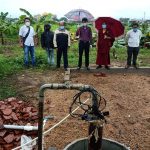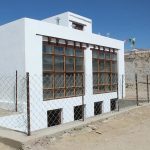The primary objective of the WASH program is to provide the Tibetan community with access to sustainable clean water sources and sanitation facilities.
The WASH program, under the Department of Health, includes not only installing drinking water and sanitation facilities, but prioritizes ensuring drinking water security and promoting conservation and hygiene. CTA has conducted integrated hydrogeological surveys several key Tibetan settlements in India and Nepal which are experiencing increasing water scarcity. Ground water source and bore wells that provide water are being managed poorly, which is leading to over exploitation and alarming depletion in the water levels, quantity and quality. Unless a path is found to replenish the water tables, a time will soon come when communities will have to buy and ship water from the outside for their drinking and sanitation needs. Based on assessment recommendations, CTA is developing long-term water security and management plans for each settlement including construction of check dams, percolation ponds and point recharge structures to infiltrate the water collected and replenish the aquifers and water table.
Other WASH activities and services benefiting settlements, schools, elder homes, and monasteries include replacement of pipelines; installation of water filters; construction of overhead tanks; construction of new toilets and renovation, garbage collection and disposal services; and waste recycle and management.






